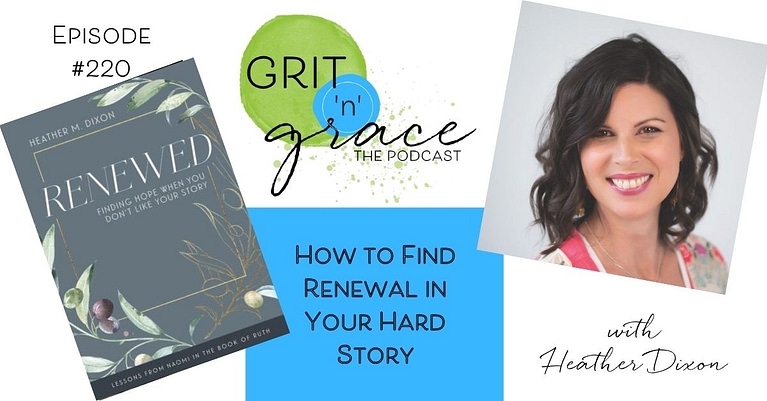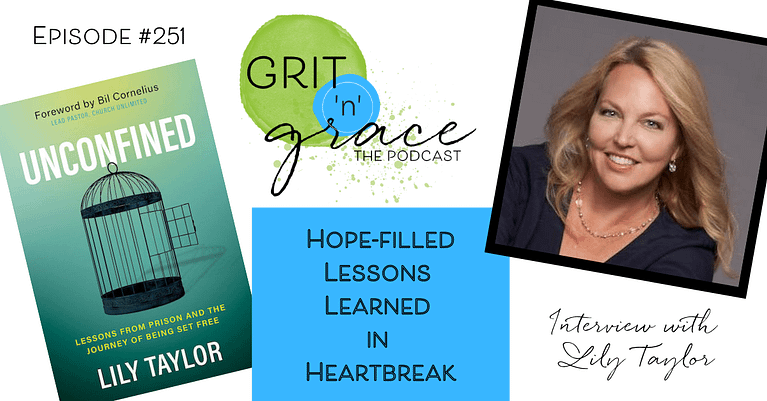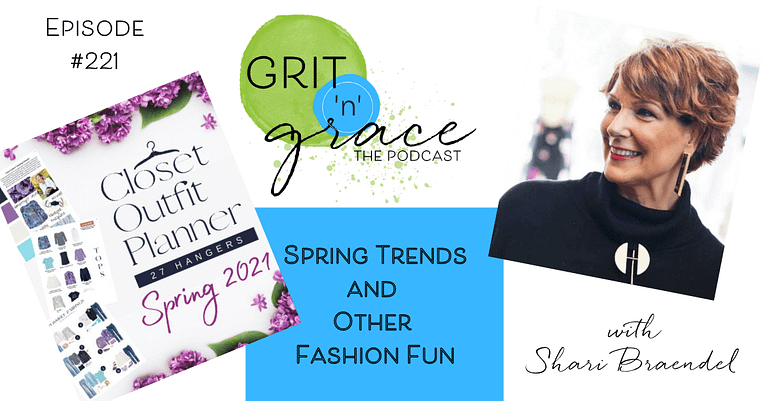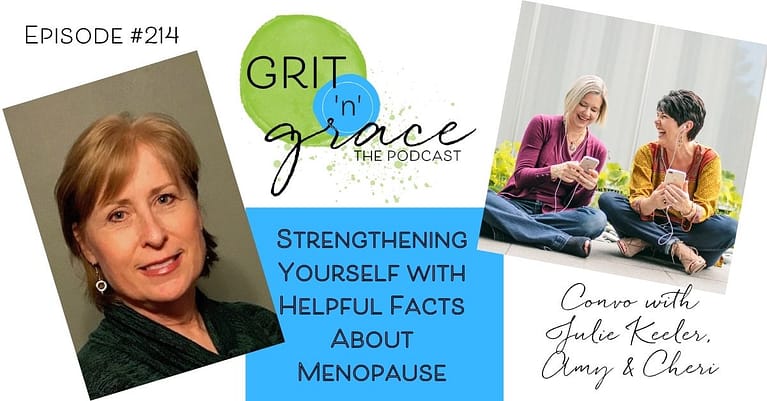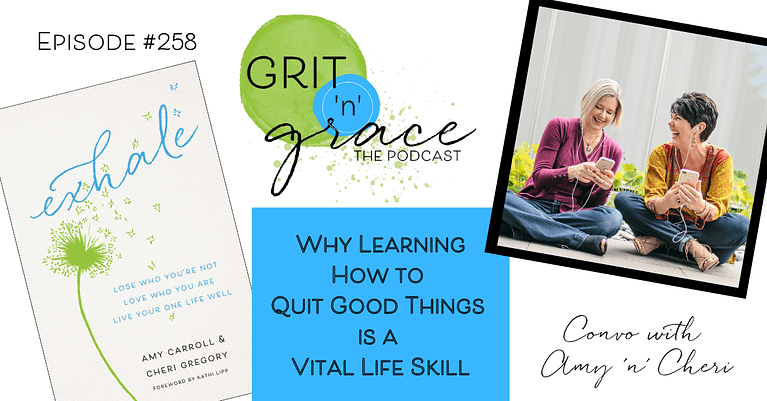How can you shed an old label? When you’re facing conflict, is there a way to handle it besides faking fine or ghosting? If you’re tired of the worn out habits that hold you back, today’s episode hold fresh ways out that will propel you forward. And don’t miss out on hearing Cheri and Amy’s super-hero names. It might inspire you to make a cape of your own!
(This page contains affiliate links. Your clicks and purchases help support Grit 'n' Grace at no extra charge to you.)
 Recommended Resources
Recommended Resources
- Amy & Cheri’s newly released book — Exhale: Lose Who You’re NOT. Love Who You ARE. Live Your ONE Life Well.
- Want a taste-test? Download the Forward, Introduction, and Chapter 1 of Exhale right here!
Downloads
Your Turn
- What has God been teaching you about fears from your past?
- What has God been teaching you about confronting problems rather than giving up on people?
Contributors
Amanda Davison lives in small town Minnesota with her husband and three children.
She is the founder of A Wife Like Me, co-author of Dear Wife, a speaker, and serves on staff at her local church, where she and her husband lead the marriage mentor team.
A former psychology professor, Amanda is now sharing how her education in counseling and God’s word changed her life and marriage. Connect with Amanda via Facebook and Instagram!
Kate Hollimon loves teaching God’s Word. She delights in helping women grasp and understand the truths of scripture through her clear and practical teaching.
Her goal in ministry is to help women see the Wonder of God’s Word through her bible studies, writing and teaching.
Kate is married to Matthew and together they have two young kiddos – a boy and a girl – and a Golden Retriever named Norman. Connect with Kate thru her website, via Facebook, and on Instagram!
Transcript — scroll to read here (or download above)
****
Grit ‘n’ Grace: Good Girls Breaking Bad Rules
Episode #156: Pull the Plug on Habits That Hold You Back
Cheri: Let me make sure it’s back on, ‘cause I’d hate to brilliant and not capture it.
<Laughter>
Heaven only knows it happens infrequently enough.
Amy: It only happens once. So.
Cheri: That’s right. It’s one of those you had to be there.
Alright, so—oh my goodness—during our last episode I almost interrupted you like five times. Well, I already do interrupt you often, so I did hold myself back from interrupting you one time. Because I realized that we finally know our superhero alter egos, or maybe this is—actually, no—maybe we are … [pause] How do superheroes work, Amy?
Amy: [Chuckles]
Cheri: Like, I don’t even know. We are already our alter egos, so I think I know our superheroes.
Amy: Yes! Yes! Our superpowers! Woo!
Cheri: Our superpowers! Okay. So, and the thing that’s so exciting is that they rhyme. They rhyme! Oh my goodness!
Amy: [Laughs] They what?! Do tell.
Cheri: We couldn’t have planned it better. Oh no, I’m going to let you reveal because you’re the one who figured me out a long time ago. And then I realized what you’ve been saying about yourself—we just need to make capes and we’re good to go.
Amy: Oh, okay. So yours has an‘N’ on it.
Cheri: Yes.
Amy: And it’s for ‘Nerdy Girl’.
Cheri: Woohoo! Nerdy Girl!
Amy: Which, for our listeners, who may be worried, Cheri’s cheering; she knows this is a high compliment, not an insult. So she’s Brainy Girl, Nerdy Girl. And I am Wordy Girl. [Laughs]
Cheri: [Laughs and Claps] Yes, you are!
Amy: With a capital ‘W’ on my cape! [Laughs]
Cheri: All right. So Nerdy Girl and Wordy Girl, here we go. We now know what goes on our capes; we know our superpowers. [Chuckles]
Amy: Everybody else is shaking their head a little, but we’re excited. [Chuckles]
Cheri: All right. So for all three of you who are still listening…well, this is Cheri Gregory—
Amy: And I’m Amy Carroll.
Cheri: —and you’re listening to Grit ‘N’ Grace: Good Girls Breaking Bad Rules. The podcast that equips you to lose who you’re not, love who you are, and live your one life well.
Amy: Well, so today we are kind of riffing off of chapters four and five in Exhale. In Chapter 4 you have just such a great chapter, Cheri, that you talk about losing your old labels. So ‘Wordy Girl’ has not always been a label that I have rejoiced in.
Cheri: Mmm.
Amy: I was thinking about this, that for a long time I had a lot of shame about ‘Wordy Girl’—partially because of the grades on my report cards. I always got the bad grade and the comment, you know, “She shouldn’t talk so much to her neighbors” That kind of thing.
Cheri: [Giggles]
Amy: Years ago we were part of a dinner group with friends. These were real friends, just to be clear, [chuckles] real friends who hurt my feelings really bad.
Cheri: [Chuckles]
Amy: We played this horrible game one night, that one of the girls thought was so much fun, that we basically picked on each other about what we thought each other’s weaknesses were—
Cheri: Oh no!
Amy: —I don’t remember the name of this game, but I wouldn’t recommend it to anyone.
Cheri: That’s not a game. That’s called junior high and high school. We left that behind.
Amy: Oh my gosh, that’s exactly what it felt like. It really, really did. Her family had played it and evidently her family is different than mine; they loved it.
I remember it so clearly that one of the things was you had to vote for ‘who was most likely.’ So ‘who was most likely to have a thriving room of plants because they talked to them all the time?’ That was kind of the gist of it. [Chuckles]
Cheri: [Snorts]
Amy: Guess who won that one? That would be me! So I tried to, like, arrange my face—
Cheri: Oh.
Amy: —and then I sobbed all the way home in the car. Now, this was—I was an adult.
Cheri: Yeah. Yeah.
Amy: Yeah, I was in my forties. And so, did they mean to hurt my feelings?
Cheri: No.
Amy: Absolutely not. [Chuckles] Were they right? Oh yeah! [Laughs]
Cheri: [Groans]
Amy: But it was just an area that I had tried to work on.
Cheri: Yeah.
Amy: And that I felt just a lot of shame about. It just made me think about, there was some good things about that episode and some bad things. The good thing actually was, is I thought, “Hm. I need to listen more.”
Cheri: Hmm.
Amy: And for those of us who have a lot of words this is important. We don’t want to be that person known for ‘monologue-ing,’ in a group.
Cheri: [Chuckles]
Amy: [Chuckles] We don’t want to be the person that people avoid because they can’t get off the phone with them. You know, that person. And I can be that person. On the other hand, it is one of my gifts.
Cheri: Yeah.
Amy: And I had to embrace it. So the good thing was I really did determine that I was going to really work on listening more.
Cheri: Mmm.
Amy: The bad result was I really removed myself from that group.
Cheri: Yeah.
Amy: So that group of friends, really—we’re not close anymore, and it really, really hurt me. So it was probably a little bit of an overreaction in that [chuckles].
Cheri: [Chuckles]
Amy: But there was also a needed adjustment.
Cheri: I’m going to have compassion for—I know that you’re kind of that borderline HSP, one foot in, one foot out of being a highly sensitive person, but your description of arranging your face is such an HSP move. When we’re in the midst of a situation and we’ve been blindsided, and we know that having a reaction right then and there isn’t safe. Getting that face put into place until we are in that safe place to break down or whatever we need to do, that is—oh—that means there really was some form of unnecessary embarrassment and humiliation going on even if it wasn’t intentional. So I’m just going to say my HSP heart is sad for that whole situation. I’m like, “Mmm!”
Amy: There’s a difference between inviting people to laugh with you—which I do often.
Cheri: Yes. Mm. Mm.
Amy: Self-deprecation is more my form of humor. And I’m good with that.
Cheri: Mmhmm.
Amy: And having people laugh at you without being invited—
Cheri: Yeah.
Amy: —that feels really bad.
Cheri: That’s a really important point. Yes. Total agreement there.
So for me we’ve talked in the past about me and my geekyn-ess, my nerdy-ness, my brainy-ness, whatever you want to call it. For the longest time, I saw myself as the smart one who is no fun. Like, I’d be invited to quotes “join” projects at school, but of course, you know what that was like. It was like, “Oh Cheri, Cheri, we’re starting a project. We want you! We need you!” Well, and of course when you’re in junior high, high school you’ll take most anything that seems like belonging, but of course the invitation was only to do the work so that everybody could get the grade that I had earned.
Amy: Mmm.
Cheri: But never to the parties on the weekend. Here’s the thing that’s been so freeing for me after decades of trying to become fun—which, you know, the truth is those who know me well think I’m funny enough, know I have this dry sense of humor and I can be wacky—but I’m not a party girl, okay?
So to finally lose who I’m not—I’m not a party girl, I’m not the life of any party—has allowed me to love who I am, which is a collaborator. And if you break down the word collaborator it is co—labor—ator. ‘Labor’ is the middle word. I like working. So the very thing I used to feel ashamed for, which was to only be invited to do the group work for other people, is now the very thing I recognize that, “Hey, Nerdy Girl likes to collaborate and it’s cool.”
It’s been one of those—and here’s been the hard part for me, but it’s been the beautiful redeeming part—is for several years I’ve still kind of twitched like, “Oh, they only want me because I’m working for them,” “Oh, the only thing I bring is my brain,” and it’s like, “No, I can leave the fears, I can leave the twitchiness of the embarrassment and the feeling like I’m boring, and realize no, no this is who God created me to be.” And when I collaborate with people—people like you—I have fun!
Amy: Well, I was about to say, “‘Nerdy Girl,’ you are tons of fun!”
Cheri: [Chuckles]
Amy: [Laughs]
Cheri: Hey, we get emails from women saying that they like laughing with us, and I’m like if you had asked me back in junior high and high school if that was ever going to happen I would have been like, “No! I’m not that kind of person.”
Amy: Same! Same.
Cheri: So yeah. Part of it—and I know we’re going to talk about leaning into things next—but part of it is: instead of twitching and avoiding those fears from the past to really pray-cess them, let the Holy Spirit speak into them, and realize that we aren’t who we used to be. For me, I always felt like it was defining moments, and to realize there are no defining moments, God defines who we are and we are in this process of growing and learning. Parts of who I once was—that I thought I wanted to leave far, far behind—actually large parts of them are still with me, and I’m now learning to celebrate them. That’s just, I don’t know that’s been really fun and exciting.
Amy: It is. And that’s a glimpse of our, the next section of our book, but we’ll get there.
Cheri: It is. Yes, we will. Sorry, I’m rushing ahead.
Amy: No! It’s great.
Cheri: So we asked a couple of our first ever interns, from that first brave group who said, “Yes, we’ll join you even though you’ve admitted to us you know nothing about what you’re doing.”
Amy: [chuckles]
Cheri: We asked, “What has God been teaching you about fears from your past?” And here’s Amanda Davison who went on to found the website A Wife Like Me.
Amanda: Well, I really have a deep ingrained fear from my past of not being enough for people. In particular, my parents are divorced, so I grew up questioning whether or not I was enough for my dad who would often not show up on the weekends. Also for my mom who seemed disappointed when I would have to stay home, and this fear of not being important or wanted, really in adulthood led me to holding back. Thinking that I have nothing of value to offer to people, that I must not be, or have anything special for other people.
But God has really been teaching me that these feelings that arise, even if they’re not truth, that these feelings can actually connect me to other people. That even in the wrestle of the real and the hard, if I’m able to identify that struggle, acknowledge it, share it with God and with other people, not only does he meet me there, I’m actually able to invite other people to meet God there with me.
So my fears become really a connecting point to other people to bring them to the throne of God with me. So I get to choose, and we get to choose whether or not this fear will be a hurdle that holds us back, or if it will serve as a catalyst that connects people to God.
Amy: Hearing what Amanda had to say, I felt the deep pain of that. Of feeling unsure about where she stood with both of her parents. You know she transformed that deep pain into a new perspective about how that helped her to connect with other people. Those deep pains, they don’t go away. Can we just say that?
Cheri: [sighs]
Amy: So I am sure there are days that Amanda defaults to that. Just like I default to feeling shame about being too wordy or being too whatever.
Cheri: Mmhmm.
Amy: So we all have days when we struggle, but I think her point is that we don’t have to be stuck—
Cheri: Mmm.
Amy: —in that struggle. If we have a growth mindset, a mindset that says, well, we take baby steps along the way and that failure is all part of it that, that includes being able to reframe the old labels.
Cheri: Mm.
Amy: Which flips them from failure to connecting points. And that’s what she did so beautifully. One of the things that I always say that Amanda said, in other words, is the deeper our vulnerability; the deeper the connection that we can have with other people.
Cheri: Okay, say that again.
Amy: The deeper the vulnerability; the deeper the connection. And man, that is so scary! Isn’t it? [Laughs]
Cheri: [Groans] Yeah, well I kind of feel like we need to drop the mic and say, “Well we hope you enjoyed this episode of Grit” […] that is just so good and so true. Because the thing about our fears from the past is they try to tell us the exact opposite—don’t be vulnerable. Hide, hide. Run away. Avoid. Yet that means we’re going to lose the very thing that we’re looking for. I love the contrast that struggle doesn’t mean stuck.
Amy: Mmm.
Cheri: Struggle is going to be normal for all of us, but it doesn’t mean that we’re stuck. The deeper the vulnerability; the deeper the connection. Okay, listeners, I don’t know where you are, but I’m sure you’re finding that as memorable as I am. I need to remember that in my everyday relationships because, as you know, I’m a runner and a hider, and that’s what we’re going to talk about next.
I realized we have another ‘c-word’—and we’re not really talking about control in this episode but—we’re going to move on to talk about confrontation. Oh my goodness, it’s another big ole ‘c-word’ that—oh—God has really been working with me on. I have always tended to be one to just fake fine while I’m dying inside. What has been your approach when there’s been a problem that you don’t actually want to confront with somebody?
Amy: Well, I don’t fake; I disappear.
Cheri: [Chuckles]
Amy: I mean, I’ve talked about that on the show that I am a quintessential ‘ghoster’.
Cheri: I was going to say that. [Chuckles]
Amy: So you won’t know there’s anything wrong, not ‘cause I’m hanging out and faking like I’m okay but I have disappeared completely from your life.
Cheri: She’s gone!
Amy: Like the dinner club that I just talked about.
Cheri: Yeah.
Amy: So boundaries [chuckles] it’s what we’re going to talk about with confrontation, and when things are going badly. Brené Brown, Cheri and I are both huge fans, she has this great quote. She says, “Compassionate people ask for what they need. They say no when they need to—” Which feels so confrontational to some of us.
Cheri: [Giggles]
Amy: —“and when they say yes they mean it. They’re compassionate because their boundaries keep them out of resentment.” Woo!
Cheri: I’m going to interrupt you really quickly because you said something really important: you said saying no feels really confrontational to people like you and me.
Amy: Yes.
Cheri: I would never in a million years have put it that way, but you’re so right. Yet when people in my life who are really healthy with boundaries say no to me I don’t perceive it as a confrontation; I perceive it as just —it’s the next thing they needed to say to me. So interesting. Sorry, I didn’t mean to interrupt your flow of thought, but I’m thinking there’s listeners going, “Wait! Wait! Did she just say what I think she said?” So I just really wanted to highlight that. Keep going.
Amy: That’s interesting because that is a people-pleasing trait isn’t it?
Cheri: Oh yeah.
Amy: That we want to say yes to everybody.
Cheri: Mmhmm.
Amy: And saying no is hard because it feels—we’re not fulfilling their expectations. But I love that Brené Brown said that, “They’re compassionate because their boundaries keep them out of resentment.” If we start reading the gospels with this thought in mind, Jesus modeled this beautifully for us. In Chapter 5 that we’re talking, I talk about and teach through the scene of Jesus being at the temple when he was twelve instead of with his parents. When you start digging into that, that’s some rich stuff right there. But what he says to them, he says, “Didn’t you know I had to be about my Father’s business?” He basically had given them a no. He didn’t apologize for“Oh I’m sorry I wasn’t with you.” He was like, “Uh, hello? This is what I’m supposed to be doing.” One of the sentences that I wrote that I’m still trying to live is that God’s directions become our boundaries.
Cheri: Mmm.
Amy: So when we know what God has called us to, which is a work in and of itself, then we’re able to have clear boundaries because we’re like, “No, I can’t do that because God has given me this.”
Cheri: Mmhmm.
Amy: It allows us to be compassionate towards people that are asking us so that ‘no’ doesn’t feel like the confrontation. I guess that’s the point, right? So then we don’t feel like we have to ghost or hide or fake fine; we really are fine. Jesus, I don’t think was upset that his parents were upset; I don’t think he was flustered by that.
Cheri: So good. Well, and we asked a question again of another one of our founding interns, author, and speaker Kate Hollimon responded to, “What has God been teaching you about confronting problems rather than giving up on people?”
Kate: Confronting a problem rather than giving up is a hard lesson to implement. It’s uncomfortable and can cause tension, but the long-term result is worth the short-term discomfort. Amy, I loved the definition you shared in chapter 5 of Exhale about boundaries. When you said that a boundary means choosing God’s direction over someone’s expectation.
You know, God has had to work this truth into me over the course of a few years, and while I can attest that it is, in fact, painful to confront others’ expectations, it’s incredibly freeing when it’s done in grace. It’s free because in confronting those expectations, you break the hold they have on you, then you’re able to walk more freely in God’s direction for your life. And you know, in the end, God is the one that I will stand before to give an account for my life. I won’t stand before those who tried to heap their own expectations on me. So being about my Father’s business, as you described it, Amy, it just brings immense freedom.
Amy: Well she is so right; it does bring freedom. It was interesting, in an interview last week, someone asked me, “What was your favorite chapter and what was your hardest chapter to write?” This—Chapter 5—was my favorite chapter because it has a story in it about how boundaries brought both freedom and joy into our family. Now, it was hard, but I’m just going to leave that as a cliffhanger ‘cause if you want to know how that worked out in my family, then you have to buy Exhale and read it—just a shameless plug. [Giggles]
Cheri: Well, it’s the kind of story that doesn’t summarize well. You really do need the whole thing.
I think in a previous episode I started to hint that Daniel and I might have been starting to succeed at working together on a project, but I didn’t want to give a full report because we were only partway through and you never know how I might mess things up [chuckles]. But I can now report now that the project is done, that Daniel and I were actually able to collaborate and handle conflict while I was recording the chapters for the Exhale audiobook. This is huge for us because we have such opposite personalities, but I was able to stay present instead of freaking out in fear because of how badly things have gone in the past—so I didn’t let that ruin the present moment—and then instead of avoiding conflict I managed to stay present by asking questions even when I kind of felt dumb. And we made it through. And this was in record heat conditions where I was literally—I don’t think I told you this—during some of the recording I literally had sweat running down my back and then down my legs [chuckles].
Amy: Oh my, gosh! [Laughs]
Cheri: It was quite the experience because we don’t have air conditioning and we couldn’t have the windows open because it would have brought more sound into the room. Anyway, even under heat and pressure things still went well. I think for me that ability to stay present rather than—fear from the past gets me in trouble because I go backwards and then fear of conflict I’m all worried about the future and I think part of what we’re talking about here is staying present in the moment and really focusing on the needs of those who are involved.
You have paired this episode with amazing scripture. Tell us about it.
Amy: It’s a familiar scripture, but I just love it. It is Isaiah 43:18-19 “Forget the former things; do not dwell on the past. See, I am doing a new thing! Now, it springs up; do you not perceive it? I am making a way in the wilderness and streams in the wasteland.”
Gosh! It literally just made me tear up to read it. There is so much hope in that. We don’t have to stay stuck. We’re still going to struggle, but we don’t have to be stuck.
Cheri: Mm. I think we can be aware of our past or learn from it, but I love that “do not dwell on the past.” So yeah, there’s just so much hope there. What’s the bad rule that we’re breaking in this episode?
Amy: Well, I love this pairing because it’s a ‘Cheri Gregory original,’ and just so beautiful and genius. The bad rule is: I’m a girl gripped by fear. And the truth is: I’m a woman held by faith.
Cheri: Mm.
Amy: It’s a beautiful picture of this, you know, not staying stuck and to embrace the new things of God both in labels that we’ve worn in the past—I love how you said that in the past it’s the labels; in the present it’s the conflict—being able to embrace something new.
Cheri: Absolutely. For me, the grit of all of this is recognizing when I’ve kind of gone back to being that girl who’s getting stuck. And it takes me grit to be able to reach back and kind of play the adult role for myself and say, “Come on, honey, [chuckles] it’s okay to struggle, but we’re going to struggle forward. And we’re going to come into the present because the past is over, it’s not happening anymore. You’re okay.” That takes grit.
I’m a ‘wallow-er.’ I’ll admit it. But I know from experience that’s no fun either, and that’s not where God wants me to stay. So it takes grit for me to pull that girl forward, who feels like she’s stuck in fear, and remind myself, “I am a woman held by faith.” What’s the grace piece?
Amy: Well, the grace for me is really living within those boundaries so I can be the more compassionate person so that I don’t ghost, I don’t cut people out, I don’t even fake fine. Because that—any of those ways of dealing with things they can look pleasant on the surface, but they cut off relationship. The grace is just living in a way that’s just full of grace towards other people, but also firmly having those firm boundaries in place.
Cheri: We hope you’ve enjoyed episode 156 of Grit ‘N’ Grace: Good Girls Breaking Bad Rules.
Amy: Make sure to join us over at our website today gritngracegirls.com/episode156. There you’ll find our transcript and this week’s digging deeper download.
Cheri: If you’re not yet a member of our Facebook group, we’d love to have you join us. Just search for Grit ‘N’ Grace Girls on Facebook and you’ll find us.
Amy: And make sure to go over to our book website: exhalebook.com. If you’re planning to lead a small group this year, we would love for you to lead Exhale.
And Cheri and I will be giving support to leaders, so enter your email to get all the scoop!
Cheri: For today: grow your grit, embrace God’s grace. And when you run across a bad rule? You know what to do. Go right on ahead and break it!
Amy: ‘n’ Cheri: Break it!
Take-Away for Today:
We are no longer girls gripped by fear. We are women held by faith!
You’ll never miss an episode when you sign up for weekly updates!







